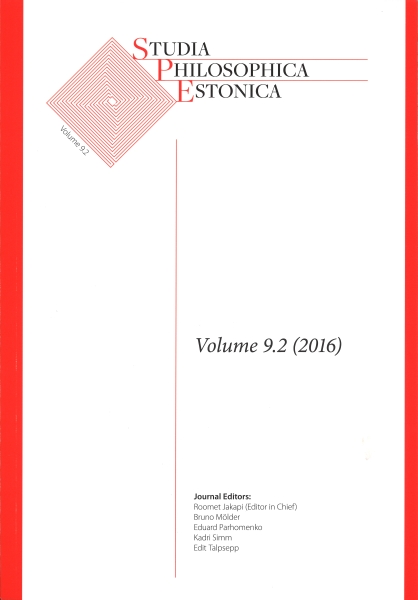The unattainability of the true world: the Putnamian and Kripkensteinian interpretation of Nietzsche’s The History of an Error
Keywords:
Nietzsche, Putnam's argument, Kripkenstein, reference indeterminacy, quietismAbstract
In this article I am interpreting Friedrich Nietzsche's piece of writing "How the "True World" finally became a fable - The History of an Error" in the context of 20th-century analytical philosophy of language. In particular, I am going to argue that the main theme in this text - the issue of abolishing "the true world" - can be interpreted as (1) Hilary Putnam's model-theoretic arguments against external realism and (2) Saul Kripke's Wittgensteinian (or Kripkensteinian) arguments against truth-conditional meaning theories. Interpreting this Nietzsche's text with the help of these arguments gives rise to two options determining Nietzsche's own position. The perspective of Putnam's argument seems to push Nietzsche to the quietist camp - the view that significant metaphysical debate between external realism and its opposite is impossible or inexpressible. On the other hand, the Kripkensteinian perspective gives us reasons to interpret Nietzsche as an adherer of the pragmatic account of semantics, which explains meaning through the use of language.
Downloads
References
Boghossian, P. (1989). The rule-following considerations, Mind , 98: 507-549.
Bornedal, P. (2010). The Surface and the Abyss: Nietzsche as Philosopher of Mind and Knowledge, Walter de Gruyter.
Brandom, R. B. (1994). Making it Explicit: Reasoning, Representing, and Discursive Commitment, Harvard University Press, Cambridge, MA.
Button, T. (2013). The Limits of Realism, Oxford University Press, Oxford.
Clark, M. (1990). Nietzsche on Truth and Philosophy, Cambridge University Press.
Heidegger, M. (1979). Nietzsche. Volume I-II, Harper & Row, San Francisco. Translated by David F. Krell.
Kripke, S. (1982). Wittgenstein on Rules and Private Language, Harvard University Press, Cambridge, MA.
Lewis, D. K. (1984). Putnam's paradox, Australasian Journal of Philosophy , 62: 221-236.
Miller, A. (2007). Philosophy of Language, 2nd edn, Routledge.
Nietzsche, F. (1954). The Portable Nietzsche, Penguin Books, New York. Edited and translated by W. Kaufmann.
Putnam, H. (1977). Realism and reason, Proceedings and Addresses of the American Philosophical Association ,50: 483-498.
Putnam, H. (1980). Models and reality, Journal of Symbolic Logic , 45: 464-482.
Putnam, H. (1981). Reason, Truth and History, Cambridge University Press, Cambridge.
Wittgenstein, L. (2001). Philosophical Investigations, Blackwell Publishing, Oxford.
Wright, C. (1992) Truth and Objectivity, Harvard University Press.

